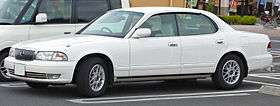Amati Cars

In the late 1980s, Mazda diversified in the Japan market with the launch of three new marques. The company created Autozam, Eunos, and ɛ̃fini, in addition to the Mazda and Ford brands already marketed there.
In early 1992 Mazda planned to release a luxury marque, Amati, to challenge Acura, Infiniti, and Lexus in North America, which was to begin selling in late 1993. The initial Amati range would have included the Amati 300 (which became the (Eunos 500/Xedos 6) in Japan and Europe), the Amati 500 (which became the Eunos 800 in Japan and Australia, Mazda Millenia in the U.S., and Mazda Xedos 9 in Europe) and a luxury sports coupe based on the Mazda Cosmo.
By far the most ambitious Amati vehicle out of the line up is the Amati 1000. This vehicle featured a 4.0 litre (3981cc), 3-bank, naturally aspirated W12 DOHC engine that was proposed to be limited to 276 bhp (206 kW; 280 PS) (per the Japan auto industry's gentlemen's agreement)[1] but actual horsepower amounts have not been found.[2][3] Each cylinder bank had a displacement of 1327cc, or three proposed Mazda series B3 engines mated together at the crankshaft.
The W12 engine featured an aluminum engine block, Magnesium cylinder heads and oil pan, and fitted with ceramic valves and pistons (perhaps ceramic coated). Sadly the 1000 and the W-12 were never put into production. The Amati marque was eventually scrapped before any cars were sold. The entire brand diversification experiment was ended in the mid-1990s.
The following vehicles were planned for the Amati brand. Those that were rebadged versions are noted in parentheses.
- Amati 300 sedan (Eunos 500/Xedos 6)
- Amati 500 sedan (Eunos 800/Xedos 9/Mazda Millenia)
- Amati 1000 sedan (Mazda Sentia)
- Unnamed luxury coupe based on the Mazda Cosmo coupé
|
References
The first mention of the Amati luxury brand was in Motor Trend magazine February 1992 page 118, the article written by Maryann N. Keller. In the June 1992 issue, the Amati logo was displayed in green, and they mentioned that the advertising campaign was to be handled by Los Angeles based Lord, Dentsu & Partners who had an advertising campaign budget of $75 million, with a launch to be slated at the end of 1993. The November 1993 issue on page 18 stated that after Amati had been cancelled due to recession, the Millenia was originally to be sold as an Amati.


